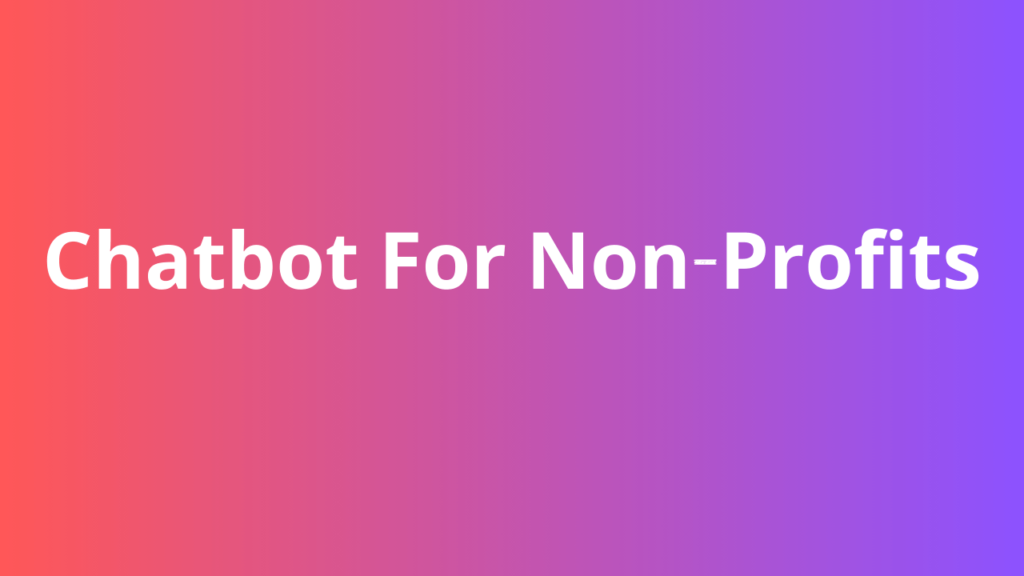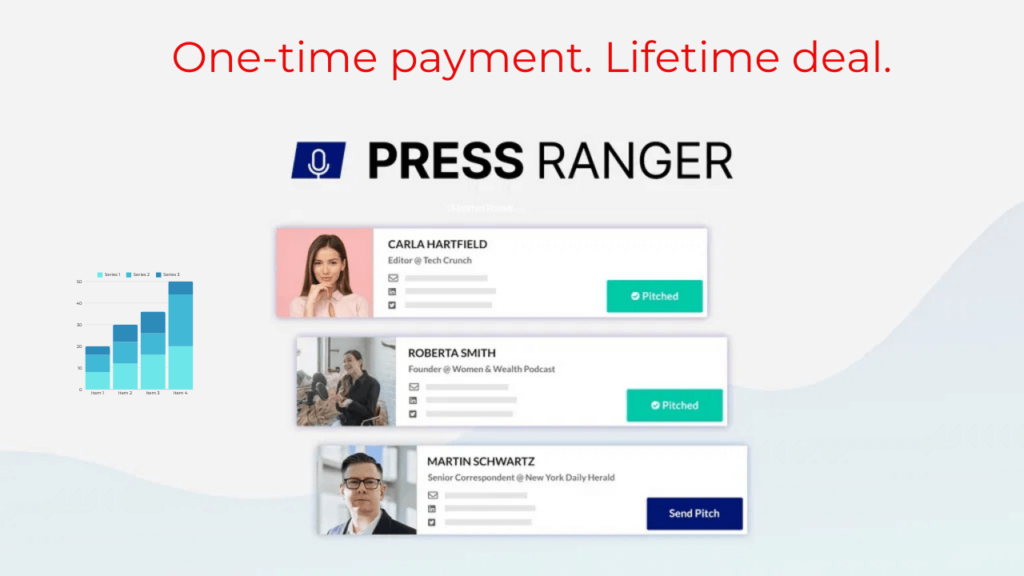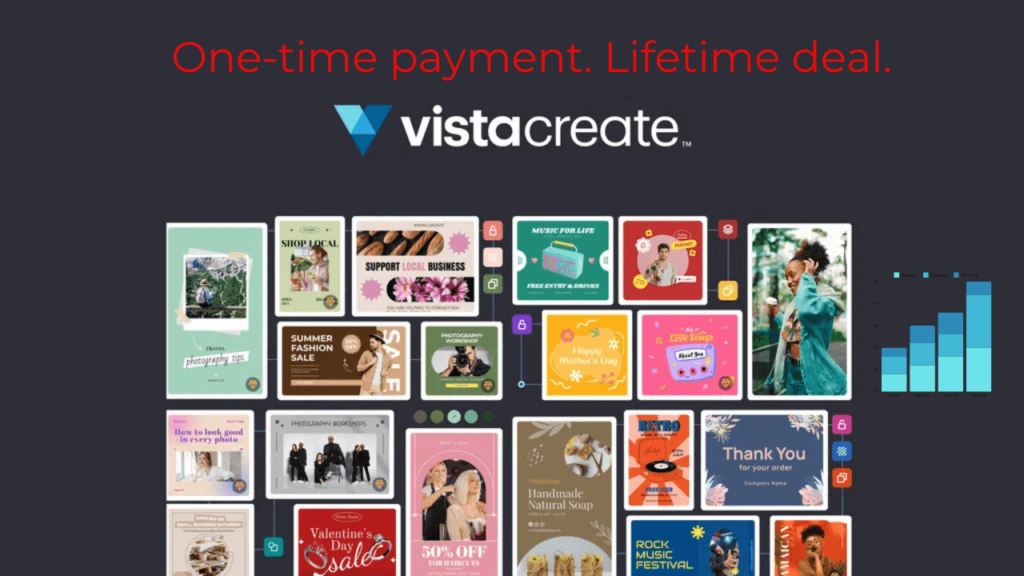Non-profits often struggle to manage their limited resources effectively. Enter Tiny Talk, a versatile AI chatbot platform designed to ease this burden.
Tiny Talk allows non-profits to create, train, and deploy chatbots with ease, even without coding skills. With Tiny Talk, you can build chatbots that answer questions, provide support, and even generate leads. Integrate these chatbots into your website, WhatsApp, or other platforms effortlessly.
This tool ensures that your organization can deliver quick, accurate responses, enhancing the overall experience for your audience. Plus, it offers features like live human support and GDPR compliance, making it a reliable choice for any non-profit looking to improve its engagement and efficiency. Discover how Tiny Talk can transform your non-profit’s communication strategy.
Introduction To Chatbots For Non-profits
Non-profits often face challenges in managing resources effectively while maintaining high-quality services. One solution is using chatbots. Chatbots can help non-profits streamline communication and improve efficiency. In this section, we will explore how chatbots can benefit non-profits.
Understanding The Role Of Chatbots
Chatbots are AI-driven tools designed to simulate human conversation. They can handle various tasks, from answering frequently asked questions to collecting data. For non-profits, chatbots can automate routine tasks, freeing up staff to focus on more critical activities.
Chatbots can be integrated into websites, social media platforms, and messaging apps. This integration ensures that non-profits can reach their audience across multiple channels. Tools like Tiny Talk offer no-code chatbot creation, making it accessible even for non-technical users.
Purpose And Potential Impact On Non-profits
The primary purpose of chatbots in non-profits is to enhance communication and efficiency. By automating responses to common inquiries, chatbots reduce the workload on staff. This automation allows staff to focus on more strategic initiatives.
Chatbots also have the potential to improve engagement with supporters and beneficiaries. They can provide instant responses, improving user experience and satisfaction. Features like live human take-over ensure that complex queries can be handled by human agents when needed.
Using platforms like Tiny Talk, non-profits can customize chatbot behavior and appearance. This customization helps maintain a consistent brand voice. Additionally, chatbots can assist in lead generation and data collection. This data can be used to segment audiences and tailor communication strategies.
Moreover, chatbots are a cost-effective solution. They help non-profits save on operational costs while increasing efficiency. With tools like Tiny Talk, non-profits can deploy chatbots quickly and without extensive technical knowledge.
| Feature | Benefit |
|---|---|
| No-Code Chatbot Creation | Allows easy setup and deployment without technical expertise. |
| Customization | Ensures the chatbot matches the non-profit’s brand and tone. |
| Integration | Connects with multiple platforms like WhatsApp, API, and Slack. |
| GDPR-Compliant | Ensures user data privacy and security. |
| Lead Generation | Captures and exports leads with enriched data points. |
Overall, chatbots like Tiny Talk provide a versatile tool for non-profits. They help improve communication, efficiency, and engagement. By leveraging AI technology, non-profits can better serve their communities and achieve their missions.
Key Features Of Chatbots Beneficial For Non-profits
Non-profits face unique challenges in their operations. Chatbots can help streamline processes, enhance engagement, and maximize resources. Let’s explore the key features of chatbots that are particularly beneficial for non-profits.
Automated Donor Interaction
Chatbots can automate interactions with donors, providing instant responses to common questions. This helps in building strong relationships with potential and existing donors.
- Instant answers to donation inquiries.
- Automated thank you messages and follow-ups.
- Efficient handling of recurring donations.
24/7 Support Availability
Non-profits often operate with limited staff. 24/7 support availability ensures that inquiries and support requests are handled at any time.
- Round-the-clock assistance for volunteers and donors.
- Quick resolution of issues and questions.
- Better engagement with international supporters.
Personalized Communication
Personalized communication is crucial for non-profits. Chatbots can customize interactions based on user data.
- Tailored messages to different segments of donors.
- Personalized volunteer engagement.
- Enhanced donor and volunteer relationships.
Efficient Volunteer Coordination
Efficient volunteer coordination is essential for non-profits. Chatbots can help manage volunteer schedules and tasks.
- Automated scheduling and reminders.
- Quick updates on event changes.
- Streamlined communication with volunteer groups.
Data Collection And Analysis
Data collection and analysis are vital for non-profits to measure impact. Chatbots can collect and analyze data efficiently.
- Gathering feedback from donors and volunteers.
- Analyzing interactions to improve services.
- Tracking engagement metrics and donor behavior.
Using a platform like Tiny Talk, non-profits can build, train, and deploy chatbots effortlessly. With features like no-code chatbot creation, integration with WhatsApp and APIs, and live human take-over, Tiny Talk offers a comprehensive solution for non-profits to enhance their operations and engagement.
How Chatbots Revolutionize Engagement
Chatbots are transforming how non-profits engage with their audience. They help in automating tasks, improving communication, and enhancing relationships. Let’s explore how chatbots, like Tiny Talk, can revolutionize engagement for non-profits.
Enhancing Donor Relationships
Chatbots can significantly improve donor relationships by providing timely and personalized responses. Here are some ways Tiny Talk can help:
- Instant Responses: Address donor inquiries immediately, enhancing their experience.
- Personalization: Customize interactions to match the donor’s history and preferences.
- Follow-ups: Automate follow-up messages to keep donors engaged and informed.
- Data Collection: Gather insights on donor behavior for better segmentation and targeting.
Streamlining Communication
Effective communication is vital for non-profits. Chatbots streamline this process through various features:
- Multi-Channel Integration: Tiny Talk integrates with WhatsApp, websites, and APIs, ensuring consistent communication.
- Automated Responses: Provide quick answers to common questions, freeing up staff time.
- Live Human Take-Over: Switch to human support seamlessly for complex queries.
- GDPR-Compliant: Ensure data privacy and security in all communications.
Increasing Volunteer Participation
Engaging volunteers is crucial for non-profits. Chatbots can help increase volunteer participation by:
- Easy Onboarding: Simplify the onboarding process with automated instructions and follow-ups.
- Event Notifications: Send timely reminders and updates about upcoming events.
- Feedback Collection: Gather volunteer feedback effortlessly to improve future engagement.
- Lead Generation: Capture potential volunteer leads and segment them for targeted outreach.
Non-profits can leverage these features of Tiny Talk to enhance engagement and support their mission effectively.
Pricing And Affordability Of Chatbot Solutions
Non-profits often operate on tight budgets and need efficient solutions. Tiny Talk offers affordable chatbot solutions, making it easier for non-profits to enhance their customer support without breaking the bank. Let’s explore the pricing and affordability of Tiny Talk’s chatbot solutions.
Cost-benefit Analysis
Investing in a chatbot can seem daunting. But the benefits far outweigh the costs. Tiny Talk’s chatbots can handle repetitive tasks, allowing human staff to focus on more critical activities. This leads to increased productivity and improved customer satisfaction.
Here’s a simple breakdown:
| Feature | Benefit |
|---|---|
| No-Code Chatbot Creation | Reduces development costs and time. |
| Customization | Ensures brand consistency. |
| Integration | Provides multi-channel support. |
| Live Human Take-Over | Enhances customer service. |
Subscription Plans And Custom Solutions
Tiny Talk offers three pricing plans tailored to different needs:
- Plan 1: $49 (One-time purchase, 5 chatbots, 15M characters, 15,000 messages per month, GPT 3.5)
- Plan 2: $98 (One-time purchase, 10 chatbots, 20M characters, 20,000 messages per month, GPT 3.5, WhatsApp integration)
- Plan 3: $147 (One-time purchase, 15 chatbots, 30M characters, 30,000 messages per month, GPT 3.5 and GPT 4, WhatsApp integration, API access, Lead generation, Chat history, and Helpdesk)
Each plan includes a 60-day money-back guarantee. This allows non-profits to try Tiny Talk risk-free. The lifetime access feature means a one-time payment covers all future updates.
Roi For Non-profits
Non-profits can see a significant return on investment (ROI) with Tiny Talk. The initial cost is low compared to the long-term benefits. Here are a few ways non-profits can benefit:
- Enhanced Customer Experience: Quick and relevant responses boost satisfaction.
- Cost Reduction: Automating responses cuts down on staffing costs.
- Lead Generation: Enriched data points improve outreach and segmentation.
- Increased Productivity: Staff can focus on more important tasks.
With GDPR-compliant features and white-label options, Tiny Talk ensures data privacy and brand consistency. Non-profits can enhance their operations and outreach without incurring high costs.
For more details, visit the Tiny Talk product page.
Pros And Cons Of Implementing Chatbots
Implementing chatbots in non-profits can be a double-edged sword. While they offer numerous advantages, challenges and limitations also exist. Understanding both sides can help non-profits make informed decisions about deploying chatbot solutions like Tiny Talk.
Advantages For Non-profits
Chatbots bring several benefits to non-profits:
- Cost-Effective Support: Chatbots can handle numerous inquiries simultaneously, reducing the need for large support teams.
- 24/7 Availability: They provide round-the-clock assistance, ensuring that visitors always receive help.
- Lead Generation: Advanced chatbots capture and export leads with enriched data points, enhancing outreach efforts.
- GDPR-Compliant: Platforms like Tiny Talk ensure user data privacy, crucial for maintaining trust.
- Integration: Seamlessly integrate with multiple platforms such as WhatsApp, API, and Slack for streamlined communication.
Challenges And Limitations
Despite their benefits, chatbots come with certain challenges:
- Initial Setup: Creating a domain-specific knowledge base can be time-consuming.
- Customization: Fine-tuning chatbot behavior to match the organization’s tone requires effort.
- Technical Issues: Chatbots may face technical glitches, affecting user experience.
- Limited Understanding: Chatbots might struggle with complex queries, necessitating human intervention.
Real-world Usage Insights
Non-profits using platforms like Tiny Talk have shared valuable insights:
- Increased Efficiency: Organizations report faster response times and improved support efficiency.
- Better Engagement: Chatbots have enhanced visitor engagement through personalized interactions.
- Data-Driven Decisions: Access to conversation history and demographics aids in making informed decisions.
- Live Human Take-Over: The ability to switch to human support ensures complex issues are resolved effectively.
Adopting chatbots like Tiny Talk can revolutionize how non-profits manage inquiries and support. Balancing the pros and cons will ensure successful implementation.
Recommendations For Ideal Users Or Scenarios
Chatbots have become an essential tool for non-profits. They help automate communication, improve engagement, and reduce operational costs. Tiny Talk, an AI chatbot platform, provides features that can be highly beneficial for non-profits. The following are recommendations for ideal users or scenarios where Tiny Talk can make a significant impact.
Best Practices For Deployment
Deploying Tiny Talk effectively can lead to a more engaged audience and streamlined operations. Here are some best practices:
- Identify Key Use Cases: Determine the primary functions your chatbot will perform, such as answering FAQs, providing information about events, or collecting donations.
- Customize the Chatbot: Ensure the bot’s tone and appearance align with your non-profit’s branding. Tiny Talk allows for extensive customization to match your organization’s style.
- Integrate with Existing Platforms: Use Tiny Talk’s integration capabilities to connect with WhatsApp, APIs, Slack, and more. This allows for seamless communication across different channels.
- Train the Chatbot: Utilize existing documents, PDFs, and technical content to build a knowledge base. This ensures the chatbot provides accurate and relevant responses.
- Monitor and Optimize: Use the enhanced dashboard to monitor performance and make necessary adjustments. Regularly update the knowledge base to reflect new information.
Case Studies And Success Stories
Non-profits across various sectors have successfully implemented Tiny Talk to enhance their operations. Here are a few case studies:
| Non-Profit | Use Case | Outcome |
|---|---|---|
| Save the Children | Donor Engagement | Increased donations by 20% through automated follow-ups and engagement. |
| World Wildlife Fund | Information Dissemination | Reduced response time by 50%, providing timely information to supporters. |
| Local Food Bank | Volunteer Coordination | Streamlined volunteer sign-ups, resulting in a 30% increase in participation. |
Tailoring Chatbots To Specific Non-profit Needs
Every non-profit has unique needs. Tailoring Tiny Talk to these specific requirements can enhance its effectiveness:
- Advocacy Organizations: Use the chatbot to provide updates on campaigns and mobilize supporters. Integrate with WhatsApp for real-time alerts.
- Educational Non-Profits: Create a knowledge base from educational documents and resources. Offer immediate answers to student inquiries.
- Healthcare Charities: Automate appointment scheduling and provide health information. Ensure GDPR compliance for user data privacy.
- Environmental Groups: Use the chatbot for awareness campaigns and donor engagement. Customize the bot to reflect environmental themes.
By following these recommendations, non-profits can leverage Tiny Talk to optimize their operations and enhance their outreach efforts.
Frequently Asked Questions
What Are The Benefits Of Chatbots For Non-profits?
Chatbots help non-profits engage supporters efficiently. They provide instant responses, automate tasks, and enhance communication. This leads to better supporter satisfaction and increased donations.
How Can Chatbots Improve Donor Engagement?
Chatbots offer personalized interactions and quick responses. They can send updates, reminders, and thank you messages, making donors feel valued and connected.
Are Chatbots Cost-effective For Non-profits?
Yes, chatbots are cost-effective. They reduce the need for extensive human resources and can handle multiple queries simultaneously, saving time and money.
Can Chatbots Help With Volunteer Management?
Absolutely! Chatbots can assist in scheduling, providing information, and answering questions. This simplifies the process and keeps volunteers engaged and informed.
Conclusion
Tiny Talk can be a valuable tool for non-profits. It simplifies chatbot creation and enhances customer support. Its no-code platform makes it accessible to everyone. Integration with WhatsApp and other APIs broadens its utility. Plus, the GDPR compliance ensures data privacy.
By using Tiny Talk, non-profits can boost engagement and streamline operations. Try Tiny Talk today and see the difference it can make!

Hi, I’m Tareq, the founder and author of [ Daily Saas Review], a platform dedicated to providing insightful, detailed, and unbiased reviews of the latest SaaS products on the market. With a passion for technology and a deep interest in how software-as-a-service solutions can drive business success, I’ve made it my mission to help businesses and individuals find the right tools to streamline their operations, boost productivity, and achieve their goals.
Through years of research, hands-on experience, and continuous learning, I’ve developed a keen understanding of what makes SaaS products stand out. My goal is to share this knowledge with you, providing in-depth reviews, comparisons, and recommendations to ensure you make well-informed decisions when choosing SaaS products.
Whether you’re a startup, a growing business, or an individual looking for the right software to improve your workflow, my reviews are designed to save you time and guide you towards the best tools for your needs.
Thank you for visiting my site, and I hope you find the information helpful in your journey toward finding the perfect SaaS solutions for your personal or business needs.


